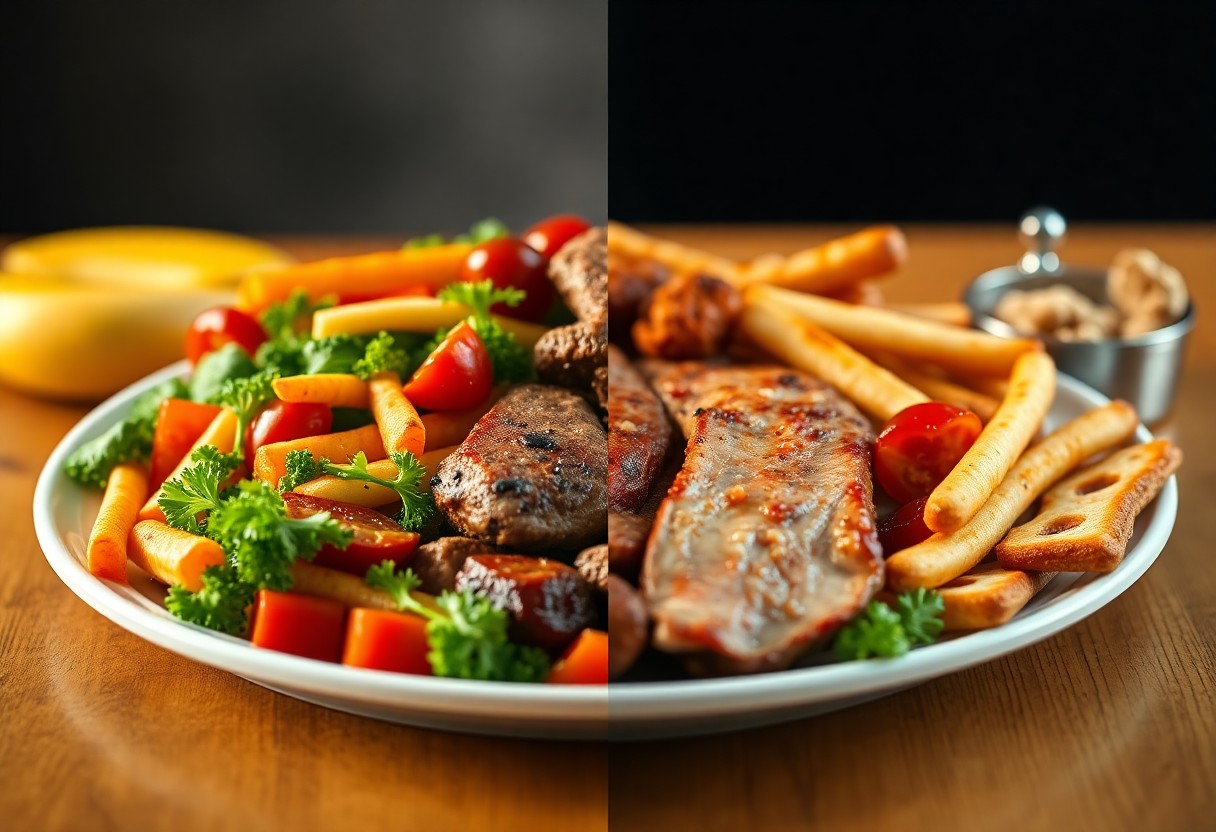You may have heard about the differences between clean and dirty ketogenic diets, and understanding these distinctions can help you make informed choices for your health journey. While both approaches aim to lower carbohydrate intake and promote fat utilization, the focus on food quality varies significantly. Clean keto emphasizes whole, unprocessed foods rich in nutrients, while dirty keto allows for more flexibility, often incorporating processed and convenience foods. In this post, you will learn what sets these two styles apart and how to choose the best approach for your goals on the keto journey.
Understanding the Ketogenic Diet
A ketogenic diet, often referred to as keto, is a low-carbohydrate, high-fat diet designed to promote fat burning for energy. By drastically reducing your carbohydrate intake and replacing it with fat, your body enters a metabolic state known as ketosis, where it becomes highly efficient at burning fat for fuel. This method has become popular for its potential to assist in weight loss and overall health improvement.
Origins of the Ketogenic Diet
Understanding the origins of the ketogenic diet reveals its beginnings in 1924 as a medical treatment for epilepsy. Originally developed to mimic the effects of fasting, the diet gained attention for its efficacy in reducing seizure frequency, especially in children. Over the years, it has evolved into a lifestyle choice embraced for various health benefits beyond its initial medical applications.
Basic Principles of Ketosis
With the ketogenic diet, your goal is to enter ketosis through a significant reduction in carbohydrates and an increase in healthy fats. This shift forces your body to utilize fat as its primary energy source instead of carbohydrates, leading to various metabolic changes.
Also, the transition into ketosis typically takes a few days to a week, during which your body adapts to burning fat more efficiently. As you enter ketosis, you may notice increased energy levels, improved mental clarity, and reduced hunger signals. This adaptation period can vary from person to person, and monitoring your macronutrient intake is vital to ensure you’re maintaining the right balance for optimal results on your keto journey.
Defining Clean Keto
Now, clean keto refers to a strict adherence to the original ketogenic diet principles, emphasizing whole and natural foods while minimizing processed alternatives. By focusing on nutrient-dense options, you facilitate your body’s entry into ketosis more effectively. This approach not only supports weight loss but enhances overall health, making it a sustainable lifestyle choice for many.
Food Choices in Clean Keto
One of the hallmarks of clean keto is your emphasis on whole, minimally processed foods. This includes nutrient-rich sources like eggs, fatty fish, grass-fed meats, and low-starch vegetables such as spinach and broccoli. By prioritizing these foods, you ensure that your dietary intake is not only low in carbohydrates but also packed with crucial vitamins and minerals.
Health Benefits of Clean Keto
Health benefits from clean keto stem from your commitment to high-quality food sources. By choosing whole foods, you’re more likely to experience optimal energy levels, improved gut health thanks to increased fiber intake, and better management of hunger. These benefits can lead to more sustainable weight loss and enhanced well-being.
The advantages of clean keto extend beyond weight management. Whole foods provide crucial nutrients that support your metabolic processes, improve satiety, and boost your overall health. Studies have shown that diets rich in whole foods contribute to decreased inflammation and improved heart health, reinforcing the long-term benefits of following a clean ketogenic approach. By investing in quality food, you help yourself cultivate a healthier lifestyle.
Defining Dirty Keto
The term “dirty keto” refers to a more flexible approach to the traditional keto diet, allowing for the inclusion of processed and low-quality foods. This variation enables individuals to have cheat days or meals, making it less restrictive than the original keto guidelines. While it can fit better into your lifestyle, it also involves taking certain risks regarding your health outcomes.
Food Choices in Dirty Keto
On a dirty keto diet, your food choices are often centered around convenience rather than nutritional quality. This includes items like processed meats, fast food, and snacks that might be low in carbs but lack important nutrients. The freedom to incorporate these foods provides variety but can compromise the health benefits typically associated with keto.
Potential Benefits and Drawbacks of Dirty Keto
By opting for dirty keto, you may find it easier to stick with the diet due to its flexibility, which can lead to weight loss for some. However, there are significant drawbacks, such as the likelihood of missing out on vital nutrients and an increased temptation to indulge in unhealthy foods. This could ultimately hinder your progress and impact your overall health if not managed carefully.
Understanding the potential benefits and drawbacks of dirty keto helps you make informed choices. While you may appreciate its adaptability, the lack of focus on whole, nutrient-dense foods can lead to an unbalanced diet. You may find yourself feeling less satisfied due to insufficient micronutrients, prompting further snacking. Balancing the convenience of dirty keto with mindful eating can assist you in achieving your health goals without compromising your wellbeing.

Comparing Clean and Dirty Keto
After exploring both clean and dirty ketogenic diets, you can observe distinct differences that may influence your choice. On one hand, clean keto focuses on whole, unprocessed foods, while dirty keto allows for more flexibility with processed options. This comparison highlights how each approach might suit different lifestyles and goals.
Comparison Table
| Clean Keto | Dirty Keto |
|---|---|
| Whole, natural foods | Flexible with processed foods |
| Higher nutrient density | Lower nutrient density |
| Reinforces healthy habits | Potential for unhealthy choices |
Nutritional Differences
About the nutritional differences, clean keto emphasizes high-quality sources of protein and fats, including fish, avocados, and leafy greens. In contrast, dirty keto may involve processed meats and unhealthy fats which could lead to deficiencies in vital nutrients. This distinction can significantly affect your overall health and wellness.
Long-term Sustainability
Comparing the long-term sustainability of clean versus dirty keto reveals that while dirty keto may appear easier due to its flexibility, it often leads to cravings and less satiety. Clean keto, with its focus on nutrient-dense foods, typically fosters healthier eating habits that can be maintained over time.
To ensure your approach is sustainable, you should consider how each version aligns with your goals. If you prioritize health and balanced nutrition, clean keto may provide a more effective foundation for long-term success. On the other hand, if you prefer flexibility, you might find dirty keto easier to incorporate into your lifestyle, but be aware of the potential health trade-offs it may pose.

Choosing the Right Approach for You
Once again, your decision between clean and dirty keto hinges on individual preferences and lifestyle choices. By taking into account your dietary habits, existing health conditions, and personal goals, you can determine which approach aligns best with your needs. Clean keto offers a more structured framework that emphasizes whole foods, while dirty keto provides flexibility that may support sustainability for some. Reflect on what motivates you to commence on this journey and choose the method that fosters your long-term success.
Personal Goals and Health Considerations
By evaluating your personal goals, you can tailor your keto experience to best suit your aspirations. Are you focusing on weight loss, improved energy, or sustainable health changes? Each approach—clean or dirty keto—has varying implications for your health, so aligning your strategy with your objectives is key to achieving optimal outcomes.
Making Informed Decisions
At the heart of choosing your keto plan lies informed decision-making. Assess your typical food choices, nutritional knowledge, and comfort with meal prep. This will help you identify the dietary approach that complements your lifestyle while being mindful of potential gaps in your nutrient intake.
In fact, understanding the distinctions between clean and dirty keto allows you to make decisions that can enhance your overall well-being. Dirty keto may offer immediate weight loss results with its flexibility, but it could compromise your intake of crucial micronutrients. In contrast, clean keto emphasizes nutrient-dense food choices, which can provide lasting energy and overall health benefits but may feel restrictive. Ultimately, balancing your goals with the knowledge of how each approach affects your health is key to crafting your ideal ketogenic journey.
Common Misconceptions About Keto Diets
Your understanding of the keto diet may be clouded by myths and misunderstandings. Many people believe that all keto diets are inherently unhealthy due to the inclusion of high-fat foods, but this varies significantly between clean and dirty approaches. Clean keto focuses on whole, nutrient-dense foods, while dirty keto may include processed foods, leading to confusion about their respective health impacts. It’s important to distinguish these variations to optimize your dietary choices.
Final Words
Ultimately, the distinction between clean and dirty ketogenic diets lies in the quality of the foods you choose. If you opt for clean keto, you prioritize whole, unprocessed foods that promote better health and energy levels, while dirty keto allows for a more flexible approach that might include processed foods and indulgences. It’s important to consider your personal health goals and lifestyle preferences when deciding which approach to take, as each has its own set of benefits and potential drawbacks. Choose wisely to ensure that your keto journey is sustainable and effective for you.


